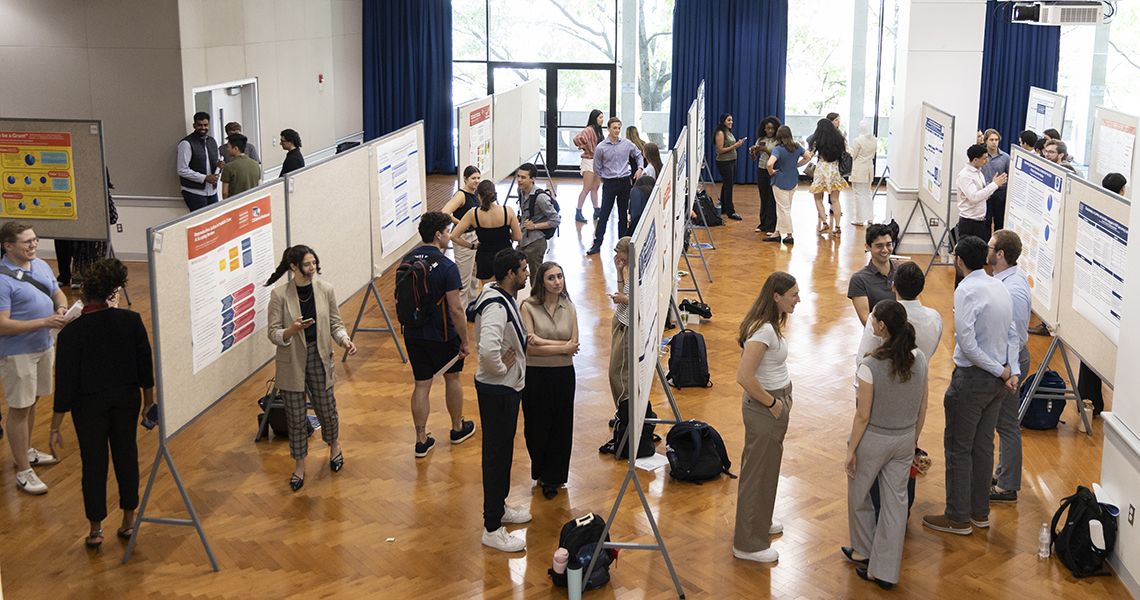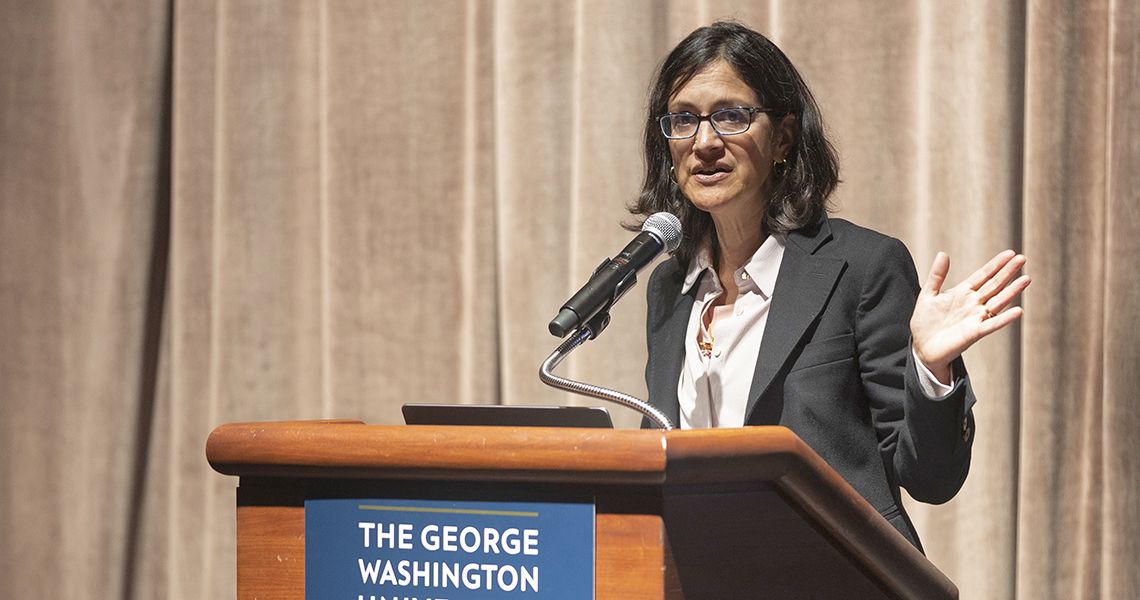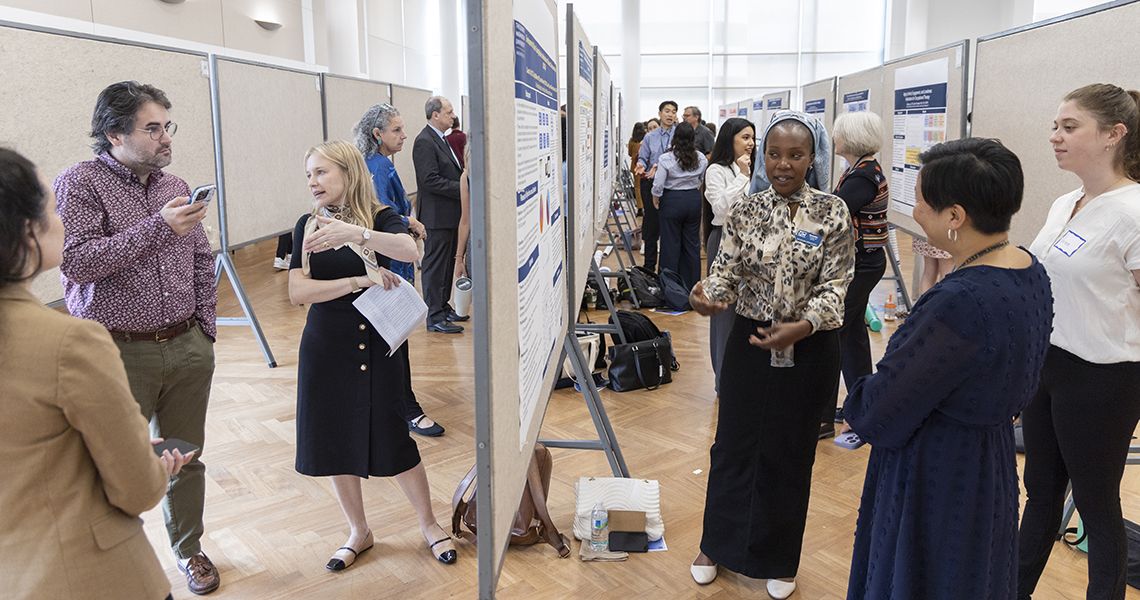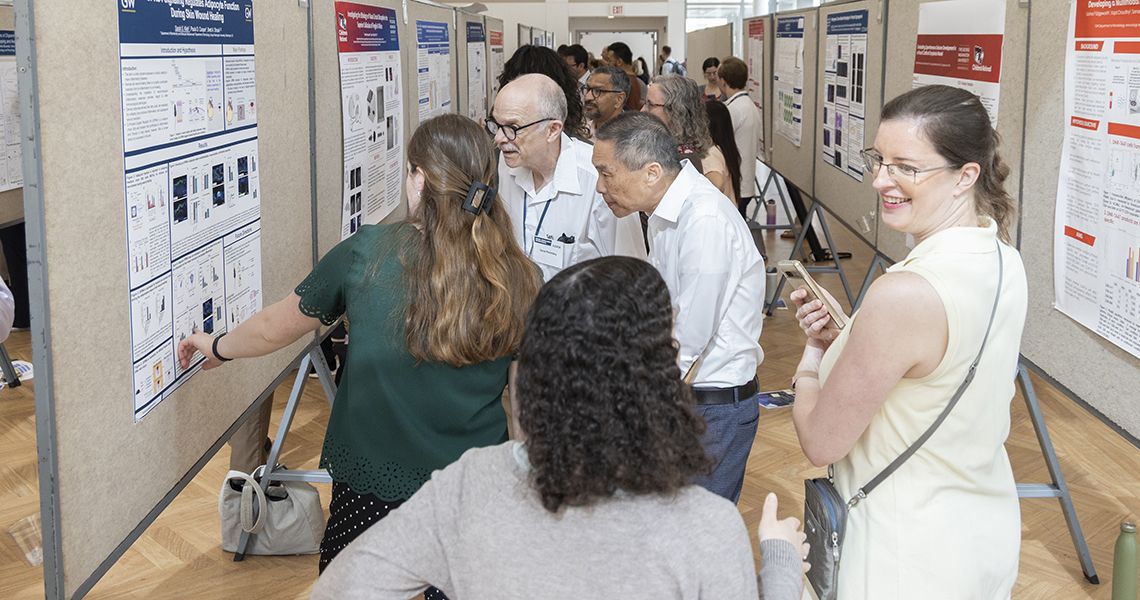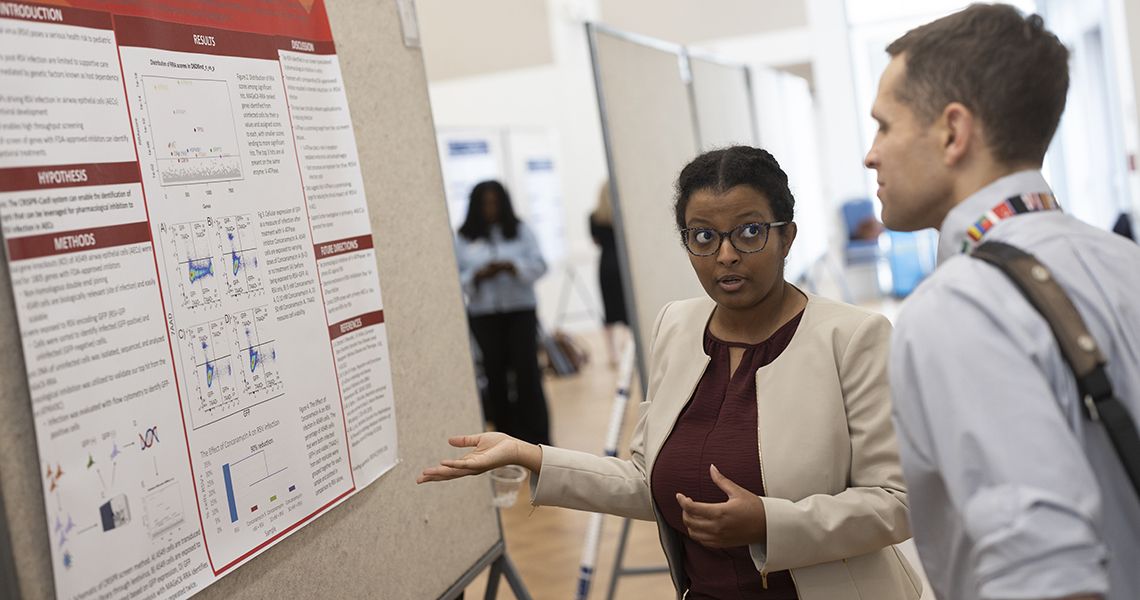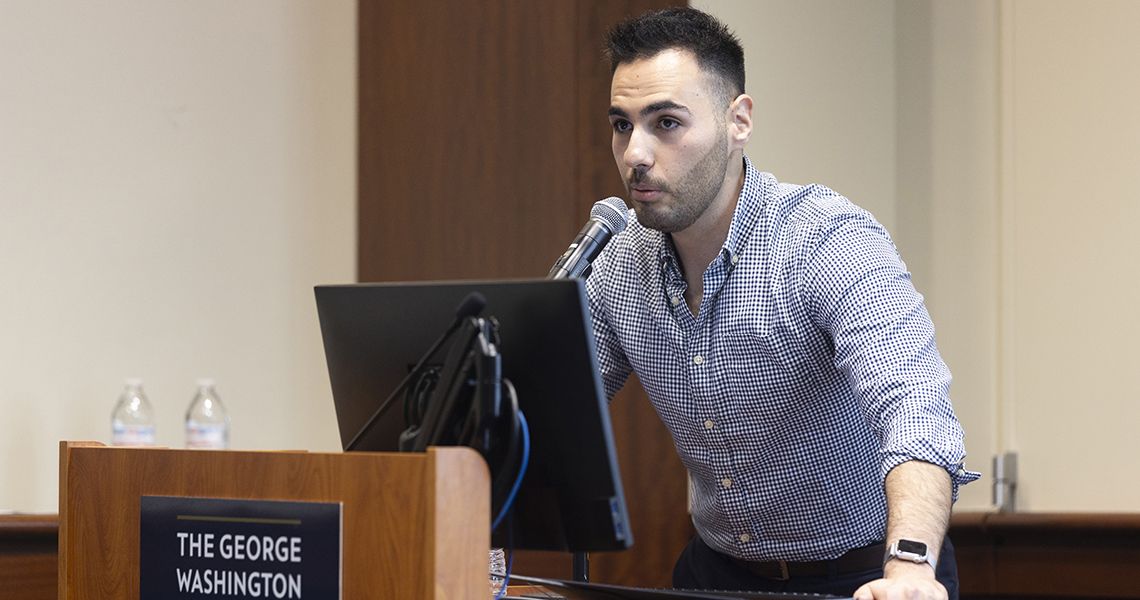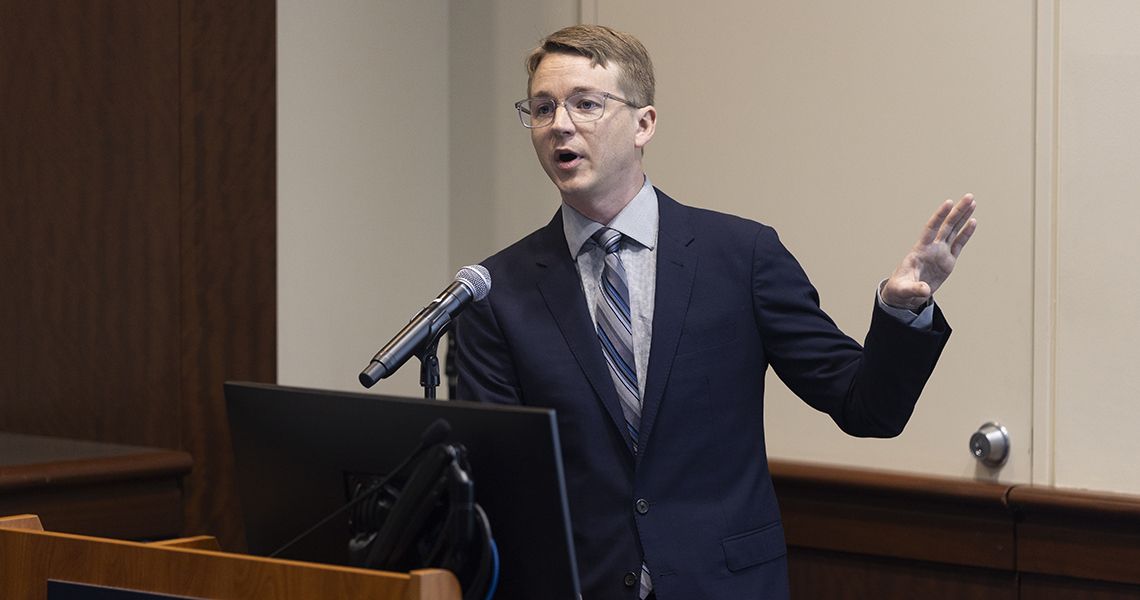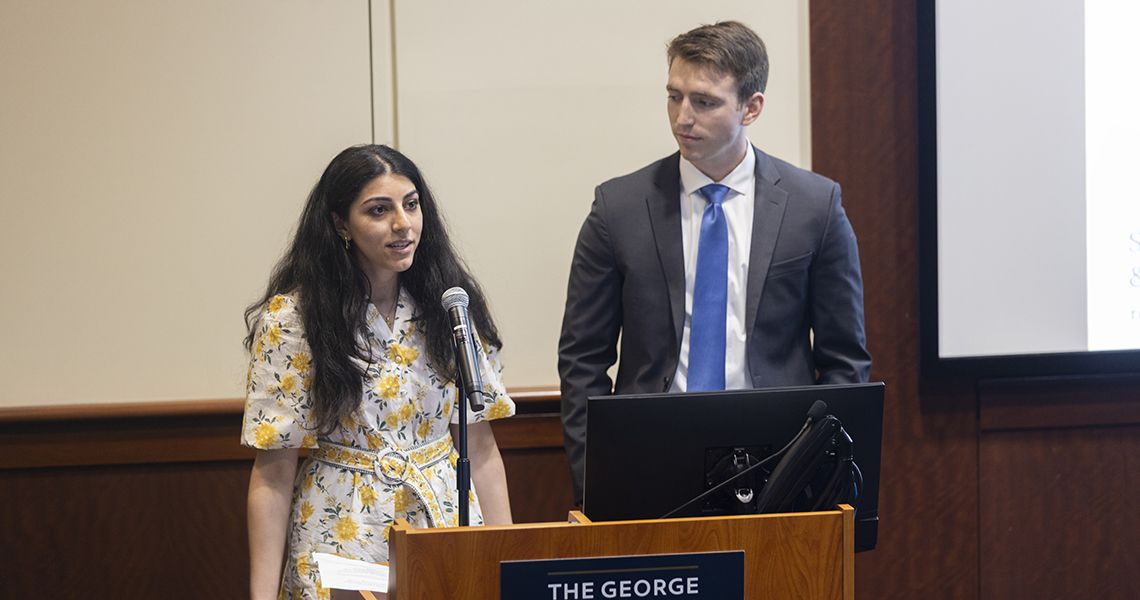The depth and breadth of research at the George Washington University School of Medicine and Health Sciences (SMHS) was on display during the 2025 SMHS Research Showcase, April 30. The annual event featured more than 300 research abstracts from across GW’s academic medical enterprise — a 10% increase over the previous year — and offered a platform for medical students, residents, PhD candidates, and health sciences scholars to share their work in basic sciences, clinical and translational research, public health, and medical education.
This year’s showcase also marked the invitation of PhD students in biomedical engineering (BME) to stimulate essential collaborations across disciplines.
Highlighting the annual event was a keynote address by Serena S. Spudich, MD, the Gilbert H. Glaser Professor of Neurology and division chief of neurological infections and global neurology at the Yale University School of Medicine.
Alison Hall, PhD, senior associate dean for research at SMHS, underscored the importance of fostering a collaborative research culture that bridges disciplines and encourages early-career investigators to explore novel approaches to academic medicine.
“Events like this not only highlight the hard work and innovation happening across our school,” Hall said, “but also reinforce our commitment to training the next generation of researchers.”
Keynote highlights neuro HIV, long COVID
Spudich described her decades of research into how viral infections such as HIV and SARS-CoV-2 affect the brain in her talk titled “A Central Nervous System Tale of Two Viruses: From HIV-1 to SARS-CoV-2.”
“This is a great honor,” Spudich told the audience. “It’s really one of my favorite things to do, to talk to people who are nascent in their careers and thinking about what they’d like to do. … I want to excite you about my area of research.”
A renowned neurologist whose clinical practice focuses on infections of the nervous system, Spudich shared insights into the persistence of HIV in the brain and the neurocognitive challenges that remain, even with effective antiretroviral therapies. She also described parallels in her work investigating neurological effects of SARS-CoV-2.
Throughout her discussion, Spudich recalled her own career journey, which she described as unconventional. Inspired early on by her basic-scientist parents, Spudich developed an early passion for neuroscience. She earned a bachelor’s degree in human biology, with a minor in the history of science, then chose to apply to a PhD program in philosophy, studying the history and philosophy of neuroscience.
“I wasn’t one of these people that knew for my whole life that’s what I wanted to do,” she explained. Ultimately, however, Spudich decided to pursue a medical degree because, she said, it afforded her the opportunity to conduct “research and be somebody who’s making a difference in the daily lives of [patients].”
Throughout her career, Spudich has studied the impact of HIV infection on the central nervous system (CNS), particularly neuroinflammation and potential neuronal injury. She discovered that persistent inflammation and potential HIV reservoirs in the brain may contribute to the ongoing cognitive impairment observed in some people living with HIV.
“One of the hallmarks of HIV is that as it replicates, it mutates,” she explained. “You can imagine that because of the way evolutionary forces work, the mutation is related to whatever forces, like immune forces and other forces, are exerted in that environment.”
The CNS provides a distinct environment from the rest of the body, allowing HIV variants to evolve separately. When HIV found in the CNS differs from that in the blood, it indicates local infection of CNS cells rather than virus simply entering from the bloodstream.
“This,” Spudich explained, “has become a very important topic for HIV cure research because people are focusing on trying to eradicate the virus from body reservoirs.”
Discovery Awards
During the showcase, winners were announced in Integrated Biomedical Sciences, Biomedical Engineering, MD, and Health Sciences research.
Abstracts and poster presentations for the research showcase by PhD candidates in Integrated Biomedical Sciences, BME PhD students, and students in Health Sciences, including biomedical laboratory sciences; clinical research and leadership; health, human function, and rehab sciences; and physician assistant studies were judged by independent panels of faculty reviewers, with outs.
IBS prizes included Harold Lamport Biomedical research prizes. Director of the IBS program Norman Lee, PhD, professor of pharmacology and physiology, announced the IBS research winners. Prize-winners represented nearly all of the PhD programs, showing the range of ongoing research and discovery among the doctoral candidates.
First Place winner Kevin Nestler presented his work on “Transposable Element Expression in Long-term Survivors of High-grade Serous Ovarian Cancer,” with Faculty Mentor: Katherine Chiappinelli, PhD, associate professor of microbiology, immunology, and tropical medicine.
“PhD students highlight their advances in projects that advance biomedical knowledge and shape our breakthroughs in disease treatment and prevention,” said Lee.
Trudy Mallinson PhD announced health sciences prizes for undergraduates and graduate students. Submitted posters were judged in advance by a panel of investigators who viewed remote and in-person presentations. Resident poster abstracts were judged in advance.
MD Honors and Awards
Closing out the daylong event, David Leitenberg, MD, PhD, associate professor of microbiology, immunology, and tropical medicine at SMHS, announced the annual MD research award winners, as well as the poster and abstract prize recipients.
This year two fourth-year medical students, Matthew Akiska and Kevin Jaatinen, received the 2025 Doris DeFord Speck, BA ’41, and George Speck, MD ’41, Endowed Prize for outstanding accomplishments in medical student research.
First-year MD student Sanika Karandikar received the 2025 Donald H. Glew Prize for her abstract and poster titled, “Completion Angiogram after Infra-Inguinal Bypasses Is Associated with Higher Morbidities without Clear Benefits in Graft Patency and Limb Salvage.”
Karandikarm, who was mentored on the project by Bao-Ngoc Nguyen, MD, professor of surgery, examined the risks and benefits of having an angiogram after Infra-Inguinal Bypass surgery, a procedure used to restore blood flow to the legs in individuals with peripheral arterial disease.
Following the endowed award presentations, the Co-Presidents of the William Beaumont Medical Honors Society, first-year medical students Francis Ryan and Priya Mukhi, presented this year’s Beaumont Society Research Awards.
“This year, we had a record of 78 abstracts submitted to the Fusion magazine representing a broad range of research interests like public health, clinical and translational research, and education-related research,” said Mukhi.
The recipients of the 2024-25 William Beaumont Research Awards were:
Bruno Coimbra, MSII, was selected for his abstract, “Damage Control Does Not Offer a Survival Advantage and Increases the Risk of Serious Complications Compared to Early Total Care in Polytrauma Patients with Femoral Shaft Fractures.”
Victoria Dreyer, MSII, received her award based on her abstract, “Immunotherapy Increases Incidence of Radiation Necrosis Following Radiotherapy for Brain Metastases and Specific Immunotherapy Classes May Be More Strongly Implicated than Others.”
Kennedy Sun, MSIII, was recognized for his abstract, “Depression in Patients with Head and Neck Cancer: A Retrospective TriNetX Study.”
Visit the SMHS Research Research Day Website to read the full list of Award Winners.
